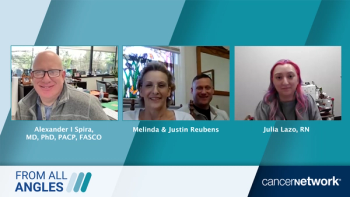
Panelists discuss how advanced EGFR-mutant non-small cell lung cancer (NSCLC) requires careful molecular testing and staging for optimal targeted therapy selection, with particular attention to patient demographics and presentation patterns.

Your AI-Trained Oncology Knowledge Connection!


Panelists discuss how advanced EGFR-mutant non-small cell lung cancer (NSCLC) requires careful molecular testing and staging for optimal targeted therapy selection, with particular attention to patient demographics and presentation patterns.

Panelists discuss Melinda's experience with her lung cancer diagnosis, including her symptoms, diagnostic tests (such as imaging and blood work), and the progression of her condition, as well as the concerns and questions she had when referred to Dr. Spira for treatment options, while also exploring the steps Dr. Spira took to confirm the diagnosis of EGFR-mutant NSCLC and evaluate the appropriate treatment approach.

Panelists discuss the typical approach to coordinating care for lung cancer patients, highlighting the involvement of various healthcare professionals and the coordination efforts to optimize the patient journey from diagnosis through treatment and follow-up, with Julia explaining her role as a nurse in the multidisciplinary care of advanced breast cancer.

Panelists discuss Melinda's perspective on care coordination during her treatment, including the healthcare professionals involved, such as those providing wound care and integrative medicine, and how their collaborative efforts supported her care, ultimately enhancing her treatment experience and confidence in her overall care.

Panelists discuss the educational resources provided to patients, with Julia explaining how she tailors patient education on breast cancer based on individual needs and preferences, while Melinda shares the courses, books, and other resources that helped her best educate herself during her cancer journey.

Panelists discuss Melinda's treatment journey for advanced EGFR-mutant NSCLC, including the specific treatments she received and her responses, while Dr. Spira provides a high-level overview of systemic therapies for the condition, highlighting the role of amivantamab and how management strategies are tailored based on patient and disease characteristics, with treatment decisions guided by available data.

Panelists discuss the shared decision-making process following Melinda's evaluation, with Dr. Spira explaining the factors that led to recommending the MARIPOSA2 regimen, while Melinda shares her active role in participating in the decision-making process regarding her treatment.

Panelists discuss how Julia prepares patients for treatment with amivantamab, including educating them on potential side effects and incorporating proactive strategies into treatment management to optimize patient care and minimize adverse effects.

Alexander Spira, MD, and Julia Lazo, RN, spoke with Melinda Reubens, who was diagnosed with EGFR-mutant NSCLC, and her husband Justin.

Panelists discuss the side effects Melinda has experienced with her current treatment and the strategies she has found most helpful in managing them, while Julia outlines her typical monitoring and follow-up procedures for patients receiving amivantamab, including the frequency of follow-up visits, labs, imaging, and the symptoms or labs that are most concerning during follow-up.

Panelists discuss the supportive care measures Julia considers for patients with advanced EGFR-mutant NSCLC, including interventions like nutrition and exercise, to enhance overall well-being and support treatment outcomes.

Panelists discuss key aspects of supportive care from the patient perspective in the EGFR-mutant advanced NSCLC journey, focusing on the strategies and resources that have been most helpful in managing symptoms and improving quality of life throughout treatment.

Panelists discuss novel agents and strategies being explored for the future treatment of advanced EGFR-mutant NSCLC, sharing optimism about emerging therapies that could significantly improve patient outcomes.